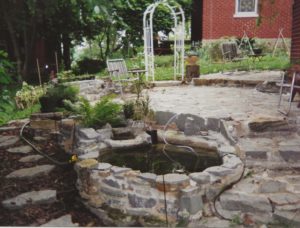
Many years ago, CW began replacing grass in our backyard with large rocks from the side of the highway. I don’t think he had a plan, other than to lay the rocks and see what materialized. First came a patio. Next, a bench with a built-in planter appeared. Then steps descended to the woods. And finally, a small pond emerged at the edge of the patio, next to the woods.
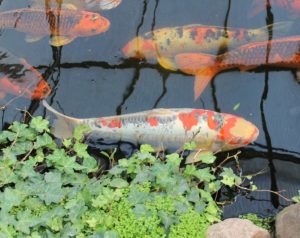
We filled it with aquatic plants: duckweed, water lettuce, water hyacinths, and a water lily. Then we bought half a dozen koi. I naturally had to pair them up and name them. I christened them Lucy and Desi, Sonny and Cher, and Scarlett and Rhett. For whatever reasons, these were couples I felt should have stayed together—always and forever—and I was heartbroken when each relationship dissolved. Maybe I was trying to give them another chance. I loved to feed our colorful couples each day and talk to them as they meandered among the plants.

Did I mention they lived next to the woods? One morning our lively, happy couples were gone, and the water garden was a disaster site. We knew instantly that the raccoons had discovered our pond during the night and had enjoyed a fine meal of fish and salad. Our ill-named koi didn’t have any better fate than their real-life and fictional namesakes.
Another pair, though, even higher on my list of special couples, had a much happier ending. Ruth and Boaz are actual people, and their story is found in the book of Ruth in the Bible. Let’s meet Ruth first.

Naomi, her husband, Elimelech, and their two sons were Israelites living in Judah. Because of famine, they moved to Moab, which was across the Jordan River east of the Dead Sea. The sons married Moabite women, Ruth and Orpah. Relations between the two nations were not friendly. Moab had greatly oppressed Israel in the past. Although individual Moabites could dwell in Israel, God had forever forbidden them to “enter the assembly of the Lord” (Deuteronomy 23: 3).
After ten years in Moab, Naomi’s husband and both sons died. When she heard Judah was flourishing again, she returned. Orpah stayed in Moab, but Ruth could not be persuaded to part from Naomi. She insisted on leaving her people and her gods to go to her mother-in-law’s home and serve her God. And she went humbly, knowing that as a Moabitess, she was unworthy of acceptance in her new home.
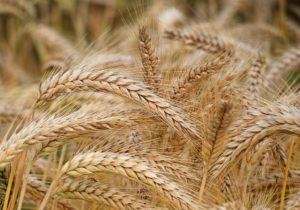
Naomi and Ruth arrived in Judah at the beginning of the barley harvest, two poor widows with no means of support. Widows were often taken advantage of or ignored. But Israel had a law to help the poor. As grain was harvested in the fields, what fell to the ground was to be left for the poor to collect, or glean. Ruth was industrious. She went to the barley fields to gather grain for Naomi and herself.
Here Boaz enters the story. Ruth found a field where she was allowed to glean. It happened to be owned by Boaz. And Boaz happened to be from the clan of Elimelech, her deceased father-in-law. That made him a close relative, a kinsman-redeemer, which will be important in their story.
Israel had another law that provided specifically for a widow. If her husband died without a son, “her husband’s brother shall take her and marry her . . . The first son she bears shall carry on the name of the dead brother so that his name will not be blotted out from Israel” (Deuteronomy 25:5-6). However, Naomi had no more sons to marry Ruth. In this case, the nearest relative could fulfill the role of kinsman-redeemer and marry the widow. If he chose not to, the next nearest relative could. If no one helped, the widow would live the rest of her life in poverty because, in their culture, the inheritance passed only to male relatives.
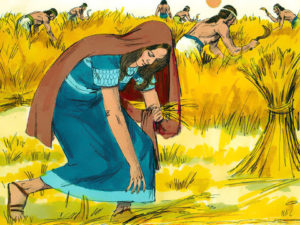
When Boaz learned who the girl was who gleaned in his fields, he spoke with her. He insisted that she not go to any other fields, where she may be mistreated. He instructed his own men not to touch her. He allowed her to glean near his servant girls as they helped bind the sheaves, even though people were not to glean in an area until the sheaves were bound and set up. He even gave her food from his table at mealtime and told her to get a drink from his water jars any time she was thirsty.
The Mosaic law of gleaning didn’t require any of this special attention. The unexpected and abundant kindness from this wealthy farmer and highly respected man overwhelmed Ruth. She humbly questioned why Boaz would show such favor to a despised Moabite woman as herself, a stranger and an outcast. I can imagine the background blurring and music softly drifting in as Boaz shares how he sees her. He knew how she cared lovingly for her mother-in-law, one of his own relatives. It impressed him that she had left her parents and homeland to live with a people she didn’t know and to serve their God. She was modest and hard-working, never complaining. Ruth and Boaz both recognized God’s character in each other.
Naomi wanted Ruth to be taken care of, so when the harvest was completed, she instructed Ruth to go to the threshing floor one night where Boaz would be sleeping by his grain. She was to lie down by his feet. Ruth was obedient to her mother-in-law. When Boaz awoke and found her there, she said, “Spread the corner of your garment over me, since you are a kinsman-redeemer” (Ruth 3:9).

The Hebrew word kanaph, translated as “the corner of your garment,” means wing or extremity (Strong’s Concordance). It is a symbol of protection, as a mother bird would spread her wing over her young to shelter them from danger, even to the extent of sacrificing her own life. Ruth was asking Boaz to protect her, to fulfill his obligation as a kinsman-redeemer. In essence, she was asking him to marry her.
That might sound forward to us, but Boaz didn’t express any such thoughts. Rather, he blessed Ruth. He well knew her humble, servant-like character and already admired her. And now, instead of chasing after younger men—for Boaz was quite a bit older than Ruth—she was seeking to marry according to Mosaic law for the honor of her deceased husband’s family. I think I’m hearing music again.
Boaz was immediately willing to honor her request, but he said there was a kinsman-redeemer nearer than he, a detail Naomi likely didn’t know since she’d been away for so long. He would check with him the next day. If the other man did not want to redeem, Boaz promised he would.
I wouldn’t be surprised if Ruth was praying to her new God through the night that the nearer kinsman-redeemer would not choose to redeem. Boaz had shown so much acceptance and kindness to her, in spite of where she came from. He had provided for her, protected her, comforted her, respected her, and blessed her. What she had was too beautiful to lose.
The next day, Boaz gathered ten elders of the town as witnesses. When the nearer kinsman-redeemer was told about the piece of land Naomi was selling, he agreed to redeem it, or buy it back to keep it in the family. However, when he heard a widow came with it, he backed down; that would complicate his life too much.
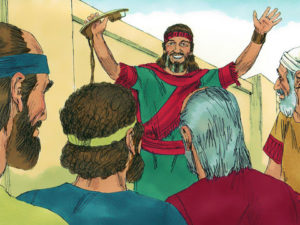
The music swells here for the moving climax. Boaz, being next in line, announced right there that he had just bought all of Elimelech’s property from Naomi and had “acquired Ruth the Moabitess” as his wife (Ruth 4:10). He made it clear there was no shame in who she was. Her redemption was complete.
Ruth and Boaz married and had a son named Obed. Obed became the grandfather of David, making Ruth and Boaz ancestors in the line of the Messiah, Jesus.
This is a beautiful love story with a happy ending, but it gets even better when we understand it is a picture of our own love story with Jesus. Just as Ruth was an outcast with no hope of acceptance, belonging, or a future, we are lost in our sin with no possible way on our own to enter the presence of God. We also need a redeemer.
Boaz fulfilled all the requirements to redeem Naomi’s property and Ruth: He was a near relative, he had the resources to pay the full price of redemption, and he was willing. In the same way, Jesus fulfilled all necessary requirements to purchase back our lives. He is the nearest kinsman-redeemer we have. He stepped down from heaven to become flesh and blood so he could experience life as we do. He can help us like no other because He suffered every temptation we have (Hebrews 2:18). Yet, He was without sin (Hebrews 4:15), making Him the only One Who could pay the price. His blood alone could pay the full ransom to redeem us from our inherited life of sin (I Peter 1:18-19). And Jesus willingly paid that price. “No one takes [my life] from me, but I lay it down of my own accord” (John 10:18).
There’s one more parallel between Boaz and Jesus. Boaz acted out of loyalty to family and the Mosaic law, but he had another motivation for redeeming Ruth. He loved her. No sacrifice would have been too great for him. And Jesus, though He was being obedient to His Father, also sacrificed his life because He loves us. “Christ loved us and gave himself up for us as a fragrant offering and sacrifice to God” (Ephesians 5:2).
Unlike the couples for whom our koi were named, Boaz and Ruth show us what a true love story looks like. And their story reveals what we can experience with our own kinsman-redeemer, Jesus—an always and forever love.
Do you hear that music? It’s God’s love song, desiring to play in your heart for eternity.

Feature image by ParallelVision from Pixabay
Images of Ruth and Boaz from Sweet Publishing at www.freebibleimages.org

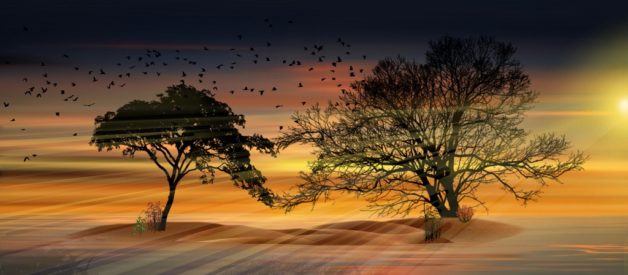
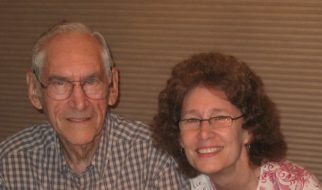
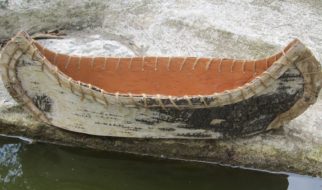
ANNE GASTRIGHT
February 8, 2021Bonnie, Your Ruth and Boaz Valentine story brought me refreshment today from God’s word. Naomi reminds me of the Holy Spirit-she was sent to Judah for a purpose and working to motivate Ruth toward abundant life.
Thanks, Anne
bspencer
February 8, 2021You are welcome, Anne. I hadn’t thought of Naomi representing the Holy Spirit. Thank you for that perspective.
marilyn
February 8, 2021Bonnie,
I enjoyed reading your blog, and thank you for sending a picture of that beautiful courtyard that CW so lovingly constructed for you!!! That’s a love story in itself. Right? Anyway, I never get tired of the story of Ruth no matter how often I hear or read it because it is truly a picture of our Bridegroom, Jesus. I just can’t wait for that wedding day!!! He is so beautiful to me- my Kinsman/Redeemer!
M.
bspencer
February 8, 2021It was pretty impressive what came out of those rocks and CW’s effort!
I never tire of the story of Boaz and Ruth either, and for the same reason. I see Jesus so clearly in it.
Angie Camp
February 9, 2021Along time ago I taught Ruth to kids in Sunday School, so I learned about kinsmen-redeemer. So much of the Old Testament points to Jesus! Love the story, your personal experiences, and the explanation of “the corner of your garment.” But my most ‘favoritest’ is the photo of mamma goose with gosling!! Angie
bspencer
February 9, 2021I love that photo, too, Angie. I never thought I’d be able to find one to illustrate a mother bird protecting her young, so I was overjoyed when I came across this one. Such a beautiful image of Jesus protecting us.
Brenda Murphy
February 9, 2021This is one of the most beautiful stories in the Bible, and it’s even better knowing it’s the story of our Jesus and his love for us. I’ve always loved this verse, from Jesus to me: “I have spread the corner of my garment over you, for I am your Kinsman-Redeemer.” Ruth 3:9,11
bspencer
February 9, 2021That will certainly put music in a heart! Such beautiful words. I had to look it up because it is different from what I read, but definitely the same idea. What translation is that from, Brenda?
Brenda Murphy
February 9, 2021I thought it was The Message but it’s apparently Brenda’s translation. 😁
bspencer
February 9, 2021Ha! I love “Brenda’s translation.” In Ruth 3:11 in the NIV Boaz says, “I will do for you all you ask,” and what you quoted is exactly what Ruth asked.